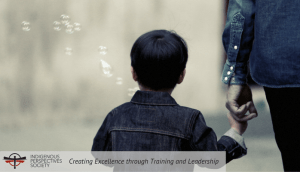 If it weren’t for my foster sisters I may not have been born. My parents moved to Canada with my older brother in 1974 and by 1975, they had settled in Kamloops. There were a lot of young families in their neighbourhood, and my mom was home a lot with my then three year old brother. Like it often is when you have been dealing with diapers for a few years, another child was not on her mind.
If it weren’t for my foster sisters I may not have been born. My parents moved to Canada with my older brother in 1974 and by 1975, they had settled in Kamloops. There were a lot of young families in their neighbourhood, and my mom was home a lot with my then three year old brother. Like it often is when you have been dealing with diapers for a few years, another child was not on her mind.
Among the neighbourhood children were two indigenous twin girls who loved to come and play with the dolls my mother sewed intricate costumes for. A historical costumer in the making, she sewed dresses held up with tiers of lace trimmed petticoats, made elaborate hats, and she even sewed the dolls name on the pockets of their pantaloons. The 9 year old girls delighted in her creations and my mother, 22 at the time, loved to have tea parties and appreciated the company while she was home with my baby brother. A year later I was born, and I was always told that their sweetness was the inspiration for my existence.
We moved away and lost touch with the girls and their family. Several years later, my father was working in a group home housing youth in transition, it was a place teenagers were sent to stay if they were in between more long-term or permanent homes. One of the girls arrived, broken and sad. They had been in a car accident with their mother and she had been killed. My parents found the other girl, and they came to live with us until they finished their education and could make it on their own. Those years were not easy and my parents were young, with young children too. Taking care of those girls was not even a choice for us. It was simply what we knew we must do.
There are many families who gladly take on caring for their community and the children they come to know and love. Indigenous children and youth need foster caregivers to support their journeys until they return to their families, extended families or communities. There is an urgent need for foster caregivers to support some of the most diverse populations of children in care. You do not have to be Indigenous/Aboriginal to be a foster caregiver; however, First Nation, Metis, Inuit Status and Non-Status Aboriginal foster caregivers are needed across BC.
To help teach foster caregivers in British Columbia the skills needed to succeed and support them through their journey, Indigenous Perspectives Society is pleased to offer its new services for foster caregivers, Indigenous Caregivers of BC. If you are interested in becoming a foster caregiver, contact www.fostercaregiversbc.ca and learn about the training, support line, and resources available to help grow healthy families and loved children.
About the Author
Alesha Doran is the Business Development Coordinator for the Indigenous Perspectives Society – Creating Excellence through Training and Leadership. A non-indigenous ally, Alesha was born and raised in Secwepemc territory and now enjoys life in beautiful Lkwungen territory on southern Vancouver Island. For more information on Cultural Perspectives Training email her at aleshad@ipsociety.ca and visit www.ipsociety.ca
